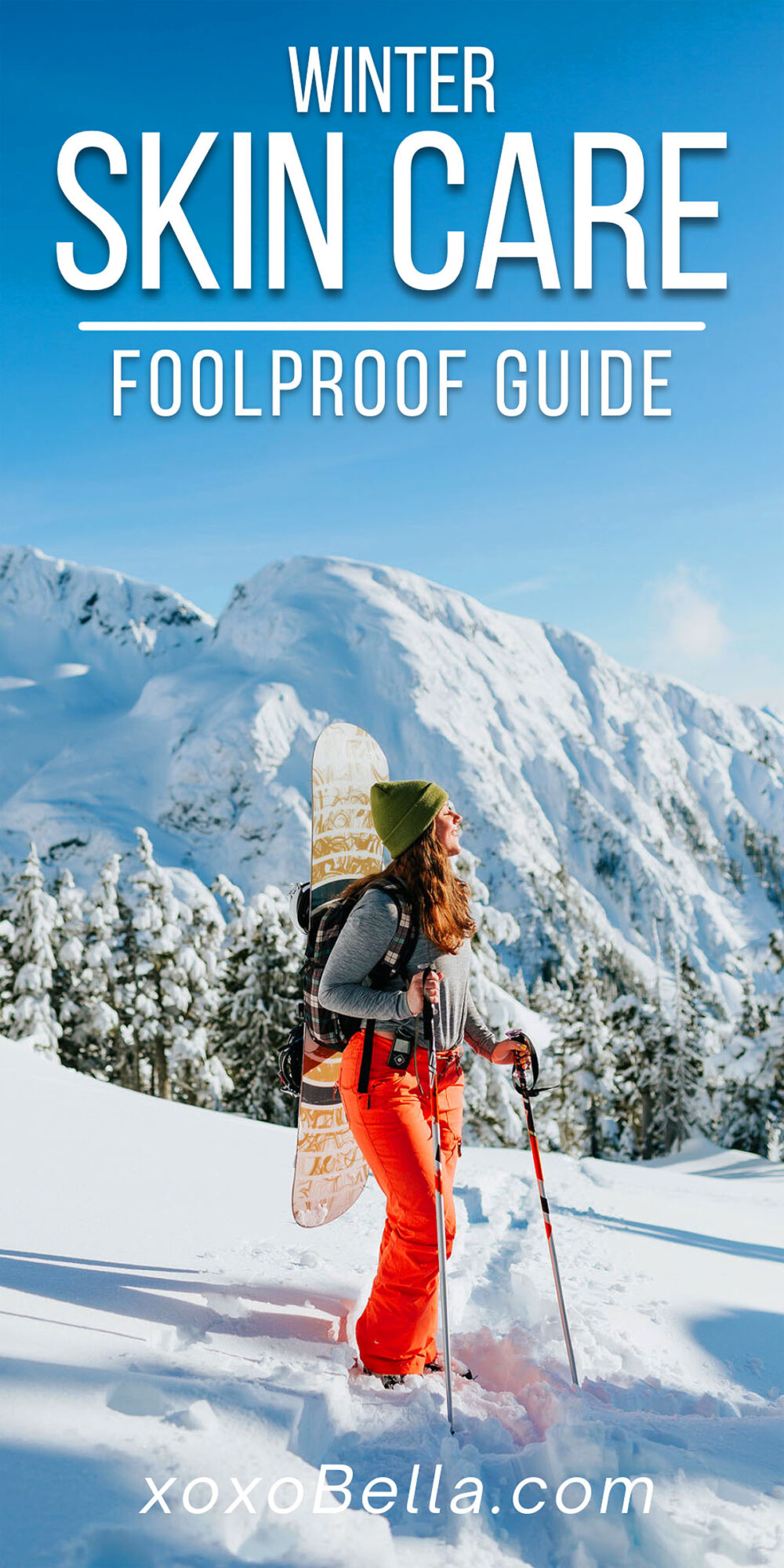This post may contain affiliate links, please see the privacy policy for details.
It’s the most wonderful time of the year again! The days are shorter, the nights longer, and the temperature has steadily gotten much colder. You’ve probably already gotten out your favourite cardigans and scented candles. But – oh yeah – your skin starts drying up too. Now that it’s winter, it’s time to up your cold weather skin care. This guide to winter skin care should help you find out how to battle dry skin for a beautiful winter glow.

Survive winter’s harsh elements with glowing skin. Stay silky smooth this winter with this foolproof guide to winter skincare! Get tips on keeping your skin hydrated and nourished in the harsh winter months.

It’s easy to forget your skin can get chapped and itchy when the cold weather comes back. But if you deal with dry skin, it’s important to protect your skin to avoid winter skin problems. If you’re like me, you’ll do anything to avoid dry, itchy, irritated skin!
To help, I’ve written up a comprehensive guide to winter skin care, which includes tips for winter skin care. I’ve also added easy, yet effective ideas for your daily skin care routine in the winter. I’m also really into the outdoors, so I’ve added a few ideas on how to protect your skin while skiing and snowboarding too.
So without further ado, here is my foolproof guide to winter skin care!

Understand Your Skin Type
Before we dive into more specific tips for winter skin, the best thing you can do is learn your skin type. When you wash your face at the end of the day, how does it feel before you apply moisturizer? If it’s:
Tight and Dry
Your skin is dry. You may be able to get away with a normal skincare routine during spring and summer months, but winter months may make your skin feel tight and itchy. If you deal with dry skin, you’ll need to use heavier moisturizers to keep your skin moisturized.

Normal
If your skin feels supple and soft when you wash your face, you likely have normal skin. Lucky you, you may not need a lot of products to keep your skin beautiful. But since winter air is drier than other months, you’ll still need to moisturize more.
Still a Little Oily
Oily skin can be a bummer during the summer months, but there’s a lot of reasons to be grateful for oily skin. Oilier skin ages slower than dry skin, and won’t get painfully tight during colder weather. Cold weather likely won’t affect your skin as much, but you’ll still need to switch a few products in preparation for winter weather.
Once you understand the skin you’re in, it’s easier to know what products to use and which tips to skip.

Use Retinol to Exfoliate
If you’ve been using a rough, physical exfoliator, you may want to consider switching to retinol to exfoliate your skin for cold weather skin care. Although retinol may irritate your skin at first, your skin will grow more tolerant to it as you use it. It’s a powerful exfoliator and will also promote cell growth, so it’ll reveal fresh, youthful skin as well as slow down signs of aging.
A little retinol goes a long way. Start with a small dose about 1-2 times a week, and then go up from there. If you start slow, you may not experience any skin irritation at all. It also won’t buff away your skin’s protective outer layers, which you desperately need during dry winter months.
Cover Your Skin
UV rays are more intense in the summertime than the wintertime, so you may be tempted to forget about cold weather skin protection. But even if the weather’s cloudy or cold, you have to remember UV rays are still present!
I don’t spend much time indoors during the winter, as I really like hiking and snowboarding. Protect your skin while skiing and snowboarding by taking extra measures to cover your skin. Wear protective hats and sunglasses to protect the sensitive skin on your face and your eyes. Sunglasses are not only important for your eyes but the delicate skin around them.

Break Out the Humidifier
This tip is great for those with dry skin. When it’s humid outside, your skin retains more moisture. But when the air is cold and dry, your skin loses water to the air. This is especially true if you have a compromised skin barrier or dry skin.
Luckily, you can add some moisture back into your bedroom with a humidifier. Just fill it up with water and turn it on at night before you go to bed. As you sleep, your skin will repair itself as well as drink in all the humid air. You’ll wake up with healthier, happier skin.
Use Gentle Cleansers
Since the air is so cold and dry in the winter time, your skin will be drier than usual. So while you were able to get away with fruity, scented cleansers and lotions in the summertime, they may cause some irritation this time of year.
Switch up your body soap and facial cleanser to gentle cleansers for cold weather skin protection. It’s okay to use a subtle exfoliant a few times a week, or as much as your skin can handle. But be careful to not overdo it, because heavy exfoliation will only make your skin more dry and irritated.

Shower in Lukewarm Water
I know, I know, showering or bathing in hot water sounds amazing when you’ve spent a long day out in the cold. But if you’re dealing with dry skin, don’t turn that handle all the way down. You’re better off soaking or showering in lukewarm water to protect your skin in the winter.
Why? Hot water strips your skin of its natural oils, which it desperately needs. Your skin likely has less oils and hydration than normal, thanks to the dry air. Wash with lukewarm water to ensure you don’t leave your skin too dry. Then once you’re out of the shower, apply lotion right away.

Keep Itchy Fabrics Off Skin
That wool winter scarf looks so cute, and it may bring out your eye color just so. But if the fabric is rough, don’t let it rub on your face. It may not seem like a big deal, but your skin is already prone to dryness and rashes when the air is cold. Itchy fabrics like wool and some polyesters can rub skin raw if it rubs against your skin.
The solution? Wear soft, breathable fabrics close to your skin. This will protect your skin in the winter.

Eat More Fish
My tips for winter skin care don’t just include products, they include lifestyle choices too. Adding more fish to your diet can improve your winter skin problems.
A diet rich in Omega-3 fatty acids keeps your skin soft and supple. Anything from the fish family, such as sardines, salmon, anchovies, and halibut are chock-full of it. But if you can’t stomach fish, feel free to take fish-oil capsules instead.
Exfoliate Less
I couldn’t have a guide to winter skin care without bringing up exfoliation. You definitely want to keep exfoliating during the winter months, since you may experience more flakiness than normal. But don’t get me wrong, you still need to cut back on exfoliation.
Exfoliation shouldn’t be part of your daily skin care routine in the winter. Cut back on harsh exfoliators or skincare peels you normally indulge in. They’ll only weaken your skin barrier when you need it the most.
Of course, you have to know what works best for your skin. If you suffer from acne and oily skin, you may not notice much of a difference during the winter months and keep exfoliating. But if you have dry skin, consider cutting exfoliation back and seeing if that improves your situation.

Turn Down the Thermostat
I know, it seems like I’m trying to take away every comfort from you! But you have to decide if it’s worth drying out your skin. The central heating system in your house dries out your skin much like a hot shower does. The air is warm and dry, so it’ll pull the moisture from your skin out into the air.
It doesn’t mean you have to give up your heater completely! Just turn the temperature up to a comfortable but cool setting. Aim for 68 degrees Fahrenheit to 72 degrees Fahrenheit to protect your skin in the winter.

Change out of Wet Clothes Immediately
In some regions, winter can mean a lot of rain or snow. Or if you’re like me, you love to exercise outside and end up either wet or sweaty from building snowmen, skiing, or hiking. Whatever the case may be, don’t stay in your wet clothes very long. That includes everything from gloves, hats, pants, jackets, and shirts.
Wet clothes cause skin to chap, not to mention you can get certain infections from staying in wet clothes for too long. Be safe and change into something dry and comfy when you’re done for cold weather skin protection.
Use Unfragranced Products
Your skincare barrier is likely compromised during the harsh winter months, making other winter skin problems worse. This is mostly true of those who have dry to very dry skin. Even those with normal or oily skin can experience some irritation when the air is very dry.
To keep your skin happy, switch out all your fragranced products for dermatologist-recommended unfragranced products. It doesn’t matter whether you smell good or not if you develop a rash from the chemicals in your skincare. That includes everything from facial cleanser to body wash to shaving cream.

Focus on Key Ingredients
One of the best tips for winter skin is to focus on ingredients. This tip will tell you how to keep your skin hydrated in the winter. If you’re anything like me, you don’t like to load up on too many skincare products. A simple skincare routine can be just as effective as a complicated one. That also means you need to make sure the products you buy can do something for your skin. If this is all foreign to you, you may want to look into some Korean moisturizers that are known for their effectiveness and quality.
Skin care companies can make it difficult to figure out what products actually moisturize and hydrate. Beyond trendy marketing, look for key ingredients to see what will benefit your skin. These key ingredients will up your cold weather skin protection:
Hyaluronic Acid and Glycerin
Whether you’re oily, normal, or dry, products that contain hyaluronic acid will add some hydration to your skin. Hyaluronic acid is a humectant, which means it draws water from the air into your skin. During the winter months, it’s best to layer hyaluronic acid products under heavier creams.
Niacinamide
During cold weather, your skin is more likely to dry out and feel irritated. That’s where niacinamide comes in: it acts like an anti-inflammatory to ease redness and irritation. This can help dry, itchy skin and even some skin conditions such as eczema and breakouts.
Niacinamide is a good ingredient to look for if you’re dealing with acne during winter. It regulates oil production while soothing acne. It’s a good alternative to popular acne treatments, which usually dry out your skin even more.

Ceramides
One of the reasons your skin gets easily irritated from winter cold is because your skin barrier could be compromised. Things we all do, such as over-exfoliating, sun damage, and not moisturizing enough can contribute to a compromised skin barrier.
Ceramides make up the building blocks of your lipid skin barrier. When you use products that contain ceramides, you’re enforcing your skin barrier to make it strong again. Once you do that, your skin will be more resistant to dryness and irritation.
Petrolatum
I know what you’re thinking, petrolatum sounds exactly like petroleum! Didn’t we spend all of the early 2000’s trying not to put oil on our faces?!
Turns out, popular skin care marketing didn’t have our best interests in mind. Dr. Mamiga Turegano, a certified dermatologist, recommends using skincare products with petrolatum, which is a type of oil. This works well in thick moisturizers such as Aquaphor, Vaseline. These moisturizers lock in moisture and prevent moisture from escaping from your skin back into the air.
Unless your skin is very, very oily, almost everyone can benefit from a heavy moisturizer during the wintertime. Those with very dry skin may notice a significant improvement in their skin’s health.

Incorporate Serum into Your Routine
Like I said before, I’m not into an extensive product collection. Anything I add has to have 1) purpose and 2) be uncomplicated. That being said, serum can do wonders for your skin if you’re looking for an extra glow that seems to go away during the winter time.
Serums can have any number of benefits, but essentially, they add nutrients to your skin while adding hydration. So, it’s not completely necessary for everyone, and if you get away with a simple cleanser and moisturizer you may not need it. But those with dry or very dry skin should add serum to their winter care routine. You’ll notice brighter, healthier, and plumper skin.
Switch to a Heavy Face Cream
This guide to winter skin care is all about hydration for your daily skin care routine in the winter. Humid summers can get away with a simple face lotion during the evenings, as the humidity in the air will hydrate your skin. Humectants like hyaluronic acid can pull water to your skin when it’s humid, but dry winters are a whole different story.
If the air is dry, it’ll pull water out from your skin to the air. Emollients, such as heavy face creams, will protect the skin barrier by not only deeply moisturizing skin but protecting your skin barrier from letting hydration out.
If you’re prone to acne or breakouts, have no fear. There are plenty of non-comedogenic face creams out there that are heavy enough to hydrate you without breaking you out.

Apply Aquaphor Around Your Eyes
It’s no secret that the area around your eyes is very sensitive to, well, just about everything. Sun damage, wrinkles, pulling, tugging, and even dryness. It’s more susceptible in the winter, especially if you deal with dry skin.
To protect your eye area, use your ring finger to gently dab eye cream around your eye. Once that dries, coat the area in Aquaphor. It’ll seal the moisture into the eye area, as well as protect against redness and eczema.
Try Dry-Brushing
Your face probably isn’t the only dry area on your body this wintertime. If your body is also getting flaky, you can try dry-brushing. You’ve probably seen dry brushes at your local store: they’re big brushes with long handles and very thick, stiff bristles.
To properly dry brush, lightly brush your skin in a slow, circular motion. The brush will physically slough off dead skin cells, revealing fresh skin underneath. It’s well-known for promoting lymphatic drainage, but it also feels really good.

Layer Your Skincare
Think of your skincare like your clothing. During the summer, you only need a few pieces of clothing to stay comfortable. But during the winter, you need extra layers to keep yourself warm and dry.
Cold weather skin care is the same way. Layering your products prevents your skin from drying, as you have multiple barriers against the elements. It also gives you the added benefit of addressing multiple skin concerns with multiple different products.
When it comes to layering your skincare, a good rule of thumb is to apply the lightest formulas first, followed by the heaviest last. For example, your watery toner goes right after washing, then serum, then moisturizer last. During the daytime, the last product should always be SPF. Even accidental exposure to sunlight adds up over a lifetime, and you aren’t immune to its effects during the winter season.
Use Overnight Masks
Looking for other ideas on how to keep your skin hydrated in the winter? What about while you sleep?
Overnight masks are an easy way to amp up your hydration game. Most overnight masks are made up of thick moisturizers that will add moisture to your skin as you sleep. It’s most effective at night because your skin repairs and heals itself while you sleep, thus allowing the mask to sink deeper and aid your restoration.

Weekly Sheet Masks
Sheet mask popularity has greatly increased these last couple of years, and it’s easy to see why. Celebrities love to wear them on planes, but you can get the same hydrating benefits by using them in the comfort of your own home.
Sheet masks can be made of a few different materials, but the most popular are hydrogel or cotton. They’re cut to shape the face and drenched in nutrient-rich serum. Don’t get me wrong, these masks look terrifying when they’re on. But the sheet masks prevent the moisture from evaporating back into the air before it sinks in.
The end result? Beautiful, glowy skin. The effect is temporary, but you can use them as often as you like. Some hard-core fans wear sheet masks as part of their daily skin care routine in the winter. But you can achieve the same glow by using a sheet mask 2-3 times a week.
Wear Moisturizing Lip Balm
In all the effort put into your skin, don’t forget about your delicate lips. You’ve probably noticed that your lips always get drier and flakier around winter time. Your lips don’t have oil glands like your skin does, so they can’t lubricate themselves. This leaves them extra vulnerable to drying and cracking.
The other problem is that since your lips dry, you may find yourself constantly licking them to provide some moisture. But saliva doesn’t moisturize your lips. Instead, it quickly evaporates and takes any little moisture on your lips with it.
My recommendation? Wear moisturizing lip balm. Keep it with you at all times, and wear something that doesn’t smell too tasty so you’re not tempted to lick your lips.
It’s especially helpful if you’re like me and spend your time outdoors. The sensitive skin on your lips gets dry outside, so wear lip balm to protect your skin while skiing and snowboarding.
Try Spot Treatments for Breakouts
Even though your skin may be drier in the winter, it doesn’t mean you’re less susceptible to breakouts. Acne can still be one of your winter skin problems when your skin is dry. But instead of aggressively treating your face for acne, try a spot treatment.
This will allow you to moisturize the larger part of your skin rather than continue to dry it out, and you can still treat the pimples themselves.
Well, there you have it! Everything you need to know about cold weather skin care in one spot. Whether you deal with dry skin, oily skin, or normal skin, you’ll find everything you need right in this guide to winter skin care.
If you’re worried, you’ll forget something, don’t fret! Just bookmark this page so you can easily come back. If you have any other tips on how to keep your skin hydrated in the winter, please let me know. Trust me, I’m willing to try anything to keep my skin hydrated during the winter!

Thanks to Kim Kufaas for the photos on a beautiful at snowboarding Mount Cain!
You Might Also Like


Bella Bucchiotti
Bella Bucchiotti is a Canadian-based syndicated food, travel, and lifestyle writer, photographer, and creator at xoxoBella. She founded xoxoBella in 2015, where she shares her love for food, dogs, sustainability, fitness, crafts, outdoor adventures, travel, and philanthropy to encourage others to run the extra mile, try new recipes, visit unfamiliar places, and stand for a cause. Bella creates stress-free and family-friendly recipes for weeknight dinners and festive feasts.













will be checking out aquafor! thanks for the tips
Amazing tips!! Great reminder! Thanks so much for sharing! Btw. I have a giveaway on my blog today! https://dreammerin.com/last-minute-giveaway-with-zaful-zafulhaul/
I pity my skin every winter because it gets super dry and sometimes flaky. Will try out some or all of your suggestions. Thanks!
Lovely pics and thanks for sharing an amazing tips for skin care.